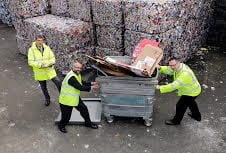

Energy
Zero Waste Scotland launches material recovery facilities code of practice guidance
New guidance ahead of legislation to improve recycling quality at Scotland’s material recovery facilities (MRFs) is being launched today at the RWM event in Birmingham, the leading policy development and trade for the resource management industry across the UK.
Developed jointly by Zero Waste Scotland and the Scottish Environment Protection Agency (SEPA) the Materials Recovery Facilities Testing and Reporting Guidance, provides assistance for licence or permit holders of MRFs in Scotland, with the introduction of sampling and testing regimes that are consistent with the requirements of the Code of Practice.
The Scottish Government has introduced the new Code of Practice for materials with the aim to improve the quality of materials entering the market, with the intention of creating the confidence needed to invest in the expansion of Scotland’s reprocessing sector. Ahead of this, Zero Waste Scotland provided grant funding for MRF operators to purchase the equipment needed to enable them to meet the requirements of the code.
The Code applies to facilities that receive, or are likely to receive, 1,000 tonnes or more of mixed dry recyclable materials (comprising of two or more materials) or separately collected dry recyclable waste for sorting, over a 12 month period.
Some local authorities are already planning ahead, and working collaboratively is Inverclyde Council. The council collects material for the MRF it owns, which is operated by Greenlight Environmental.
Launching the guide at the RWM event in Birmingham, Iain Gulland, Chief Executive, Zero Waste Scotland said: “The MRF Code of Practice is all about driving the quality of material being generated through recycling, helping to identify where there might be issues, and helping to address them. This is helps to ensure a market for recycled materials. While the Code of Practice is a change for local authorities, Zero Waste Scotland is providing support via both the new guidance we’re launching here at RWM, which outlines clearly the responsibilities of MRF operators under the legislation, and we have also provided financial support to enable the purchase of essential new equipment.
“It’s great to see local authorities, such as Inverclyde, whom we’ve helped support, planning ahead to make sure they’re ready for the changes.”
Gary Walker, Principal Policy Officer, Scottish Environment Protection Agency (SEPA), said: “By working with Zero Waste Scotland to produce this guidance, we have ensured that the new Code of Practice provides MRF operators with a clear understanding of what they can do to remain compliant. The guidance also compliments the data return forms which have been developed and will be made available for operators in late September.
“This data will be crucial in helping SEPA understand the issues that MRF operators face with contamination and the role of the whole supply chain – from collection, treatment, and onwards to end markets – in managing the quality of recycled material.”
Michael McCormick, Environment Convener, Inverclyde Council, said: “We were delighted to receive funding from Zero Waste Scotland to help us get new equipment in place, but the council’s planning ahead, and proactively collaborating with Greenlight Environmental, has been just as important in making sure we’re ready to comply with the new Code of Practice and really drive up the quality of recyclate generated in Inverclyde, and minimise contamination. This is really important for the council on order that we get the maximum financial and recycling benefit from the materials we collect.”


 Environment11 months ago
Environment11 months agoAre Polymer Banknotes: an Eco-Friendly Trend or a Groundswell?

 Features10 months ago
Features10 months agoEco-Friendly Cryptocurrencies: Sustainable Investment Choices

 Features11 months ago
Features11 months agoEco-Friendly Crypto Traders Must Find the Right Exchange

 Energy10 months ago
Energy10 months agoThe Growing Role of Solar Panels in Ireland’s Energy Future



























